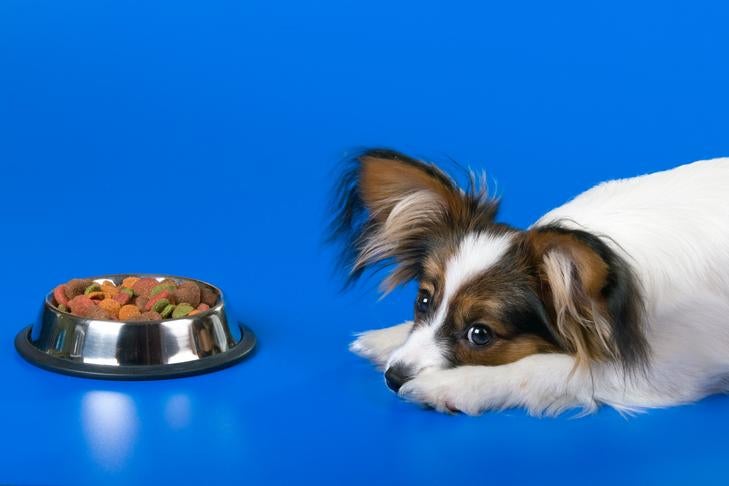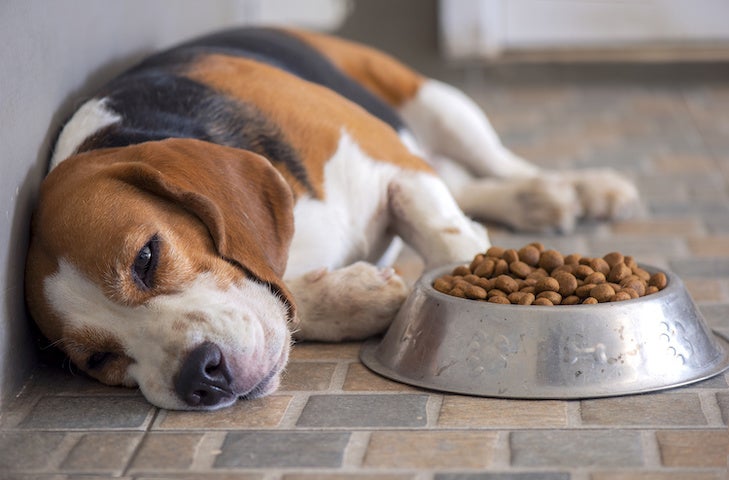
AKC is a participant in affiliate advertising programs designed to provide a means for sites to earn advertising fees by advertising and linking to akc.org. If you purchase a product through this article, we may receive a portion of the sale.
It can be very concerning when your dog isn’t eating regularly. After all, a good, healthy diet is a key part of a happy life. So what exactly is happening when your dog refuses to eat? Learn about some common, plus some lesser-known, reasons why your dog might not be eating.
Illness
The most likely reason your dog isn’t eating runs parallel to the main reason humans don’t eat at times. “They’re sick,” suggests Dr. Ann Hohenhaus, senior veterinarian at The Animal Medical Center in New York. “You don’t feel like eating when you have a fever. You feel like lying down and taking a nap. Dogs are the same. Often they have a virus, they don’t eat for a couple of days, and then they get better.”

However, if your dog is not eating and is either vomiting, having diarrhea, or both, contact your veterinarian within 8-12 hours. In the interim, you can try the following to spur their appetite:
- Warm up your dog’s food in the microwave
- Pour dog-safe chicken broth or beef broth over the food to make it more appealing
- Pour warm water over dry food to make it softer
- Feeding your dog dry food if they usually only eat wet food (or vice-versa)
- Try hand-feeding, as social eaters might just want attention
- In serious cases, your vet could prescribe a medication that could induce eating
Dr. Hohenhaus affirms that dental disease is rarely to blame for a dog not eating. But she does note that if the dog has a tumor in their mouth, that might cause them to stop eating.
Medications
Has your dog recently been put on a new medication? That drug and/or regimen change might be upsetting their stomachs.
“Treatment of a disease can make you not eat,” says Dr. Hohenhaus. “Antibiotics can give you a stomachache. Some medicines make you nauseous.” Potential culprits, she adds, could be chemotherapy and non-steroidal anti-inflammatory drugs (NSAIDs) like Rimadyl.
Social or Emotional Issues
Just as a major life change like moving to a new city, changing jobs, or a breakup can affect your appetite, an upheaval in a dog’s life can cause anxiety and affect their hunger as well.
Dr. Hohenhaus has even witnessed a canine patient stop eating after being re-homed following the death of her owner. “She was on a bit of a hunger strike, and I think it was because her life was upside-down,” says Dr. Hohenhaus. “There are two kinds of people. When your life is all upset, either you eat a lot, or you eat nothing because you’re distracted by what’s going on in your life. I would say the same is true for dogs.”
Owner Absence
If it seems like your dog doesn’t eat or drink when you’re gone, but they scarf down their food when you arrive home, know that it’s probably not just your imagination.

“Dogs are pack animals. When you’re gone, their pack is not at home. They’re waiting for the pack to be there to eat,” says Dr. Hohenhaus.
Time of Day
Some dogs only eat during specific times of the day. Maybe your pup only likes to chow down at noon, or perhaps they only finish the contents of their bowl after the sun goes down.
No matter what your dog’s preferences are, eating at the same time each day is common practice. If they only eat during one time of day, it’s likely nothing to worry about. “I have preferred times to eat, and dogs do too,” says Dr. Hohenhaus.
Food Preferences
Your pup’s shift in eating habits might also be because the formula of their regular dog food has recently changed. To combat this potential issue, Dr. Hohenhaus suggests not always feeding your dog the same type of food.
“If you look at the bag and it says ‘new and improved,’ that might not be your dog’s opinion of that food,” notes Dr. Hohenhaus. “What that means is the manufacturer has changed the food, and your dog might not like the new version. It’s good to have an alternative in case that food goes off the market, gets recalled, or it gets improved and your dog no longer likes it.”
Another reason why your dog might not be eating? The food has gone stale. Check the use-by or expiration date on the bag or even just follow your nose. If it has expired or smells weird, throw out that food and buy a new bag. A good rule of thumb is to buy bags of dog food roughly the size of your dog. For instance, buy one five-pound bag for your five-pound dog.

“You probably shouldn’t buy a 50-pound bag of dog food for a five-pound dog because, by the time you get to the bottom of the bag, the food is going to be rancid,” says Dr. Hohenhaus. “If the dog food doesn’t smell good, you might want to start over again.”
When to Seek Help If Your Dog Isn’t Eating
In cases where your dog stops eating but then resumes a few days later, it might be nothing to get concerned about. But if it doesn’t clear up relatively quickly and you notice any of the aforementioned symptoms, it might be time to seek professional help. “If your dog goes a couple of days without eating and nothing else is wrong—no vomiting, diarrhea, coughing, no having accidents—then I’m not that worried about it,” says Dr. Hohenhaus.
As mentioned above, however, if your dog is not eating and is either vomiting, having diarrhea, or both, contact your veterinarian within 8-12 hours. Dr. Hohenhaus also raises concerns about a fluctuating appetite. If you notice a marked change in your dog’s eating habits, a visit to the vet might be your best bet, as well.
This article is intended solely as general guidance, and does not constitute health or other professional advice. Individual situations and applicable laws vary by jurisdiction, and you are encouraged to obtain appropriate advice from qualified professionals in the applicable jurisdictions. We make no representations or warranties concerning any course of action taken by any person following or otherwise using the information offered or provided in this article, including any such information associated with and provided in connection with third-party products, and we will not be liable for any direct, indirect, consequential, special, exemplary or other damages that may result, including but not limited to economic loss, injury, illness or death.

